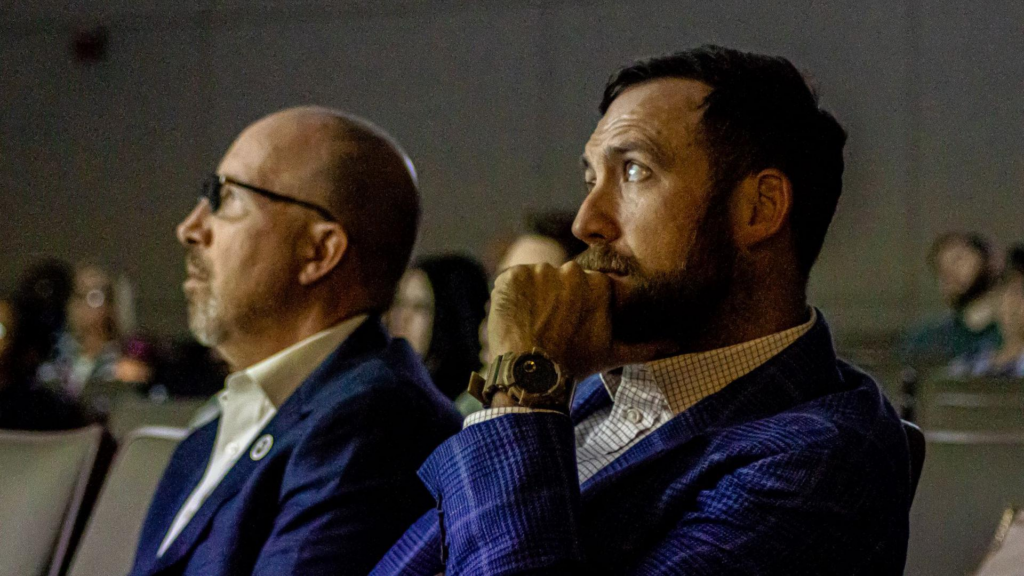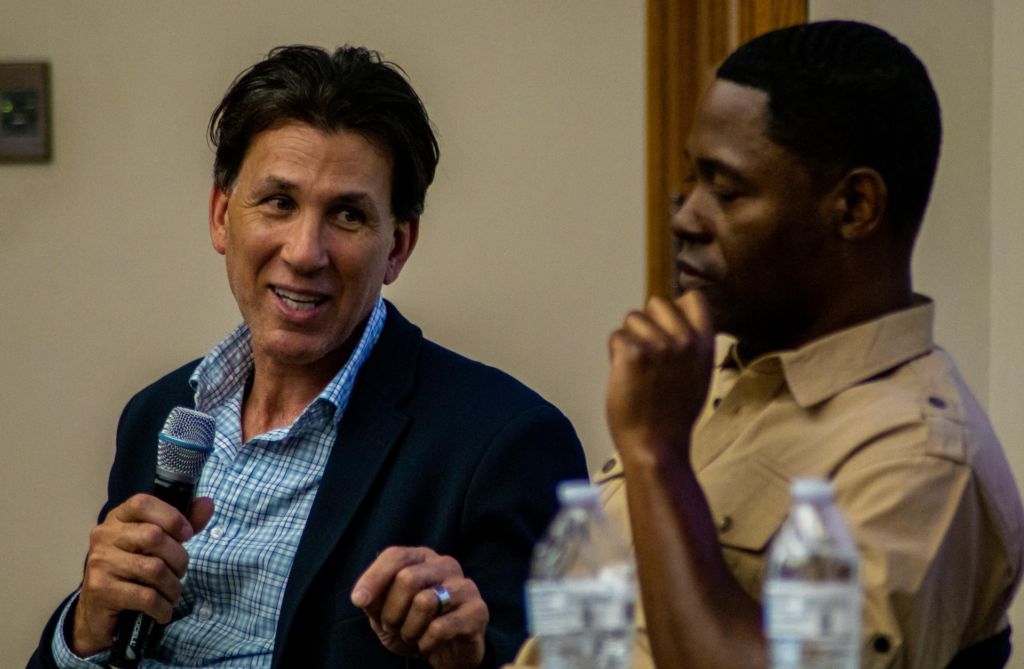Parole Project collaborated with The Visiting Room Project and Tiger Prison Project to host a screening featuring excerpts from three Visiting Room Project interviews on Wednesday, November 9 at LSU. Dr. Marcus Kondkar, co-founder of The Visiting Room Project and Chair of the Sociology Department at Loyola University New Orleans, opened by explaining the purpose of The Visiting Room Project – inviting the public to sit face-to-face with people serving life without the possibility of parole to hear them tell their stories, in their own words.

Once the lights dimmed inside the Dalton J. Woods Auditorium, viewers met Terrance Guy, Darryl Waters, and Sammie Robinson. Each vignette allowed the audience a view into the complexities and feelings of these three men who had been sentenced to life without parole. At the time of their interviews, they were 44, 49, and 80 years old and had served 23, 24, and 63 years in prison, respectively.
Parole Project client Terrance Guy opened by talking about his love for cooking and the endless requests for his signature double chocolate cake, providing the audience a lighter moment before before the tone shifted as Terrence reflected on the hardships of incarceration. He shared details of his childhood, including trauma associated with his mother’s relationships, and his remorse for the actions that sent him to Angola. “[My mother] was a big motivation for me,” he said, “because I saw her struggles and I felt as though I caused great shame on her, as her son, by coming to prison … and how it always hurt her to leave without me. So everything I always did was for myself, but in large part for her.” At a discussion following the film, he opened up about his choice to improve himself while in prison and why he felt it was necessary, even though there was no guarantee it would lead to his freedom. “I think I got to a point where I just hated myself, and I just was broken,” he said. “And I knew that this wasn’t the life that I wanted, but it was the life that I have. And the best way in dealing with it was to change. … There’s nowhere else to turn. … You’re already at the bottom, the only place you can go is up, if you want to.”
Darryl Waters began his excerpt by sharing his hope that “people can realize that there are everyday people behind these walls who love, who get sad, who are hurt, who get happy, who have dreams.” He went on to describe his journey to prison — from a good, quiet country childhood to becoming an irresponsible college student. Darryl shared his thoughts on rehabilitation and transformation, and its purpose (or lack thereof) within the structure of the prison system. His interview closed with a final reflection on how his life could still leave a positive impact, even from inside the walls of Angola. “I realize that I could possibly die in Angola. The way I cope with it is I make sure that my life is very purposeful. Every time I invest myself into someone else, I free a part of myself,” he said. “Whomever I come in contact with, I’m going to love people so passionately until a part of me will always live outside of the gates of Angola.”
The final clip highlighted Sammie Robinson, who entered prison at age 17 in 1953. He began by saying, “I survived, I sure did. I don’t know how I survived. I had a tough time.” Sammie spoke about the changes he had witnessed at Angola over his many decades in prison: how initially there were no opportunities for school, trade certifications, or rehabilitative programs — just hard, manual labor. Sammie described how he had been attacked by another prisoner in his cell block who threw lighter fluid on him that caused third-degree burns which took years to heal. The video closed with Sammie reflecting on his incarceration. “The worst thing is being in prison this long. I’d go somewhere and make me a living and start all over again,” he said. “They say the older you get, the more you learn. Well, I’ve learned a lot of things.” He closed by emotionally reiterating, “Like I said, I’ve been here all my life. I ain’t never really had a chance to get out, cause I’ve been here all my life.”
The screening ended with one final image on the screen: “Sammie passed away in 2019. He had served 66 years in prison, more time than any other man in Louisiana.”

After the film, State Representative Vanessa LaFleur led a panel discussion featuring Dr. Marcus Kondkar, State Representative and chairman of the House Administration of Criminal Justice Committee Joseph Marino, III, Deputy Director of Probation and Parole Renee DeLouche, and Visiting Room Project ambassador and Parole Project client Terrance Guy. Before any other discussion, the panelists each shared their appreciation of Terrance and his journey to redemption.
LaFleur asked Terrance what gave him hope during his time in prison. Terrance replied “hope itself gave me hope. It was the type of hope that just rejected the idea that I would die in prison. I couldn’t conceive it. I didn’t allow it to enter my mind.” He said that his mother made him promise that no matter what, he would never stop fighting and striving for freedom. Although his mother passed away in 2014, Terrance kept his promise and walked out of Angola in the spring of 2022.
Kondkar, who did most of the more than 100 filmed interviews, faced Terrance and recalled sitting down together for his interview in 2021. “I remember neither one of us thought this day would come and that you’d be sitting here with us,” he said, “but I’m so glad you were able to leave and be with us now.”
Turning to Marino, LaFleur asked if there were any political or policy pathways to bringing Louisiana more in-line with other states regarding the use of life without parole sentences. “It’s so easy for people to say [tough on crime] without even understanding what that means and why that doesn’t work,” he said. Marino then added a dash of optimism: “I think the path to effective change is what we’re doing here right now. If [other policymakers] are really interested in public safety, look outside of Louisiana and see just how extreme outliers we are.” He added that the more legislators that can come to that understanding, the better.
The panelists continued to discuss different avenues to improve public safety, from policy to systemic changes. They all agreed, however, that exposure to these ideas and experiences is what will ultimately bring it to fruition. DeLouche called upon the other panelists and audience members to “go out and tell people about this. Encourage employers and anyone to give second chances. That is how we can be successful.”
We would like to thank our panelists, Tiger Prison Project, The Visiting Room Project, and all who attended for their part in providing second chances and improving communities.




